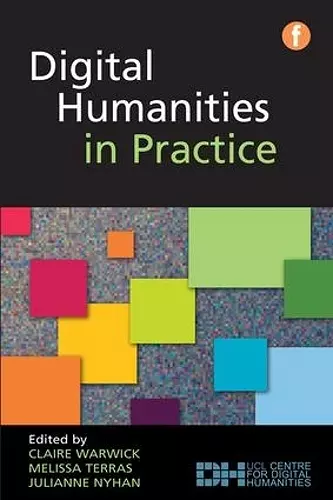Digital Humanities in Practice
Melissa Terras editor Julianne Nyhan editor Claire Warwick editor
Format:Paperback
Publisher:Facet Publishing
Published:9th Oct '12
Currently unavailable, and unfortunately no date known when it will be back

This cutting-edge and comprehensive introduction to digital humanities explains the scope of the discipline and state of the art and provides a wide-ranging insight into emerging topics and avenues of research.
Each chapter interweaves the expert commentary of leading academics with analysis of current research and practice, exploring the possibilities and challenges that occur when culture and digital technologies intersect. International case studies of projects ranging from crowdsourced manuscript transcription to computational reconstruction of frescoes are included in each chapter, providing a wealth of information and inspiration. QR codes within each chapter link to a dedicated website where additional content, such as further case studies, is located.
Key topics covered include:
- studying users and readers
- social media and crowdsourcing
- digitization and digital resources
- image processing in the digital humanities
- 3D recording and museums
- electronic text and text encoding
- book history, texts and digital editing
- open access and online teaching of digital humanities
- institutional models for digital humanities.
Readership: This is an essential practical guide for academics, researchers, librarians and professionals involved in the digital humanities. It will also be core reading for all humanities students and those taking courses in the digital humanities in particular.
"...high value for scholars interested in digital humanities and for academic support staff who are planning projects and programs. Recommended."
-- Choice"...a valuable resource not only for students and researchers in digital humanities, but for a variety of other fields of study especially information management and digital libraries."
-- Journal of Librarianship and Information Science"An extensive range of topics is covered: digitisation, image processing, 3-D recording of museum objects, text encoding, historical bibliography and online teaching materials. The use of social media, especially for encouraging public engagement in humanities research, is also discussed. There is an interesting analysis of institutional models for digital humanities (again based primarily on the activities of the UCL Centre), which touches on some broader issues connected with involvement in teaching and research as well as the provision of training and support. Each chapter is supplemented and expanded by the inclusion of a series of short case studies – projects illustrating the specific application of the topic under discussion."
-- Australian Library Journal"...high value for scholars interested in digital humanities and for academic support staff who are planning projects and programs. Recommended."
-- ChISBN: 9781856047661
Dimensions: 234mm x 156mm x 18mm
Weight: 181g
192 pages